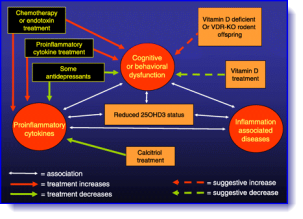The brain and vitamin D have a relationship that not everyone knows, or at least is not as popular as others, we know that a deficiency of this vitamin has an impact on our cognition and our neuronal aging, so we are faced with a neuroprotective who goes much further his role in the quality of our bones or in our ability to synthesize countless minerals.
Many people unknowingly have vitamin D deficiency; in fact, it is estimated that about 60% of people between the age of 50 and 60 suffer from a lack of this type of steroid, while the elderly population, meanwhile, has an 80% rate. This is mainly due to two reasons.
Low vitamin D levels are associated with cognitive decline and premature aging.
The first is that as we age, we stop synthesizing it so easily, the second is mainly due to our lifestyle habits. Vitamin D is synthesized by the skin and through the sun, we can also obtain it through food, especially with dairy products.
Unfortunately, due to our working hours, we leave less and stop coming into contact with sunlight, low dairy consumption and some fish will also lead us to accumulate less and less vitamin D, until gradually we show obvious symptoms.
Let’s look at all the data below
Difficulty concentrating, memory loss, difficulty thinking, pulling conclusions, retaining new information . . . are processes that may be affected by vitamin D deficiency. They are neurological symptoms that are sometimes overlooked and are not always related to this deficiency.
Usually, every time we talk about this vitamin, we link it to calcium, the strength of our bones and the appearance of osteoporosis if we do not maintain optimal levels.
The relationship between the brain and vitamin D has been known for decades, when it was discovered, for example, the large number of processes that regulate this element so essential for our well-being.
If we are without vitamin D we probably do not notice the symptoms at first, in addition, sometimes we attribute the lack of this vitamin to other disorders and problems, or even to simple aging. The goals should be to invest in good aging, in a good quality of life to take care of our cognitive processes, brain health which, like a fabulous muscle, can reach advanced ages in good shape.
Now let’s see what possible symptoms are associated with D deficiency:
Let’s take a look at other sources that we can count on to always have good levels of vitamin D:
In conclusion, considering that the relationship between the brain and vitamin D is obvious, do not hesitate to consult your doctor to find out if you have a deficiency, before using only vitamin supplements it is always advisable to seek the advice of good professionals and include in our diet foods that contain it in its natural form.
Having good levels of this element will allow us to even have a stronger immune response and a good mood to face the difficulties and daily stress, so let’s not forget the importance of a balanced diet.
As we have seen, something as simple as suffering from a vitamin deficiency has a direct impact on the health of our brain, the pharmaceutical and food industries, aware of this relationship between the brain and vitamin D, are launching products enriched with this food source. Therefore, it is common to find milks, yogurts or cereals in which vitamin D is already present.

